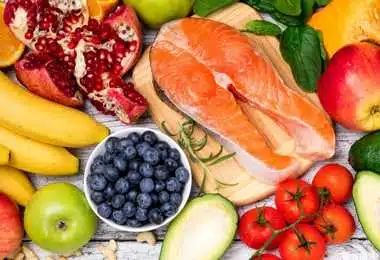
Perinatology – High-Risk Pregnancy and Follow-Up
November 1, 2023
Ectopic Pregnancy – Causes and Treatment Methods
December 10, 2023
Perinatology – High-Risk Pregnancy and Follow-Up
November 1, 2023
Ectopic Pregnancy – Causes and Treatment Methods
December 10, 2023
Proper and Regular Nutrition During Pregnancy
Nutrition, which is one of the most important elements in any period of a healthy, peaceful, and dynamic life, is of particular importance during pregnancy. The aspect that parents think about most and should pay attention to is nutrition during pregnancy. A healthy and regular diet should become a philosophy of life not during this period, but before it, to have a healthy pregnancy period. This arrangement, which was achieved before pregnancy, will continue after, and the baby will be able to easily get the nutrients it needs from the mother.
The mother's eating habits are important for the child's physical and mental development, and form the basis of the eating habits that the child will have throughout his life. Therefore, for a healthy pregnancy and a healthy generation, it is necessary to eat properly and regularly.
Unhealthy, inadequate, or excessive maternal nutrition during pregnancy provides the basis for identifying multiple risks to both mother and child.
Recommended Foods to Eat
Nutrients perform many functions in the human body. It is necessary to receive the nutrients necessary properly and regularly for a healthy lifestyle.
During pregnancy, it is necessary to eat a variety of nutrients regularly and in a balanced way. Food contains a large amount of nutrients, rather than the limited amount that pregnant women can choose, and a mother can maintain the health of herself and her baby by eating foods that meet her taste buds.
Protein intake during pregnancy is important to meet the growing demand for protein. Animal and vegetable proteins, such as red meat, white meat, milk, yogurt, cheese, eggs, dried legumes, should be consumed in equal proportions.

Image 1: Proper and regular nutrition during pregnancy.
Carbohydrate intake should also be balanced during pregnancy.
The need for certain vitamins and minerals increases during pregnancy, and it can be met with a regular and balanced diet.
During pregnancy, much more calcium is needed than during the normal period. Sufficient calcium is needed to maintain the mother's bone mass and develop the child's skeletal structure. Calcium-rich cheese, milk, yogurt, walnuts, almonds, hazelnuts, leafy greens, and dried legumes should be consumed in sufficient quantities.
Folic acid, which is important for the development of the baby's central nervous system, is important because it does not accumulate in the body and more than usual is needed during pregnancy. It is found in foods such as peanuts, spinach, hazelnuts, whole-grain bread, cauliflower, broccoli, legumes, leafy greens, citrus fruits, apples, and grapes. Folic acid is also essential for starting pregnancy before conception and during pregnancy 3. Continuing for up to a month helps reduce problems called neural tube defects, which are characterized by defects in the spinal system.
To minimize iron deficiency, which is very common during pregnancy, it should be consumed in foods such as molasses, grapes, and red meat, as well as in iron supplements prescribed by your doctor. You can not drink tea, coffee, acidic drinks, as they interfere with the absorption of iron.
It is necessary to take enough vitamins to strengthen the immune system and prevent diseases. Vitamins A, B12 and C play an important role in the development of the child, maintaining the health of the mother and increasing the body's resistance to diseases. Spinach, apricots, eggs, and carrots are rich in vitamin A; fish, milk, and dairy products are rich in B12. On the other hand, citrus fruits, tomatoes, kiwis, broccoli, rosehips, and potatoes have plenty of vitamin C.
A fibrous diet is very helpful in preventing frequent constipation and bowel laziness during pregnancy. Vegetables and fruits rich in fiber should make up the bulk of your daily diet.
A very important aspect is to consume enough water during pregnancy. Drinking water can prevent and cure many ailments during pregnancy.
Foods to Stay Away from
Since tea, coffee, cocoa, chocolate, and carbonated beverages contain caffeine, they interfere with the absorption of many vitamins and minerals and increase the risk of anemia. So, it would be appropriate to restrict it.
You can not eat sausage, salami, and sausage, raw or undercooked meat and eggs. Harmful bacteria in raw or undercooked meat and eggs can set the stage for a host of problems.
Do not eat deep-sea fish or large fish such as swordfish or shark. Small surface fish should be consumed.
Fast food products prepackaged and ready-made products containing preservatives, French fries, products with excessive fat content, baked goods should be minimized or not preferred.
Questions That Need Attention When Feeding
Smoking and alcohol consumption are important risk factors for maternal and child health.
You can't go hungry for long. In addition, excessive nutrient intake should be avoided. It can not be eaten in excess, thinking about feeding the baby.
Care should be taken to ensure that the products taken are natural or organic, seasonal, and fresh, without additives or preservatives.
Special attention should be paid to the variety of nutrients. In this way, many essential vitamins and minerals will be satisfied comfortably.
To avoid obesity and, as a result, numerous health problems during pregnancy, you should avoid excessively fatty, sweet, confectionery products, packaged products with an extended shelf life, and for a short time high-calorie and harmful products.
Excessive salt intake should be avoided. You should use iodized salt.
Canned food should be avoided.
Care should be taken to ensure that the nutrients consumed are clean, hygienic, and pasteurized.
Fresh and green vegetables should not be cooked for too long and over too high heat. Preference should be given to steaming, which is the most ideal cooking method.
What you eat is just as important as how much you eat. In addition to the fact that the nutrients are healthy and natural, you should pay attention to the amount that needs to be taken, and you should not consume less or more than necessary.
During pregnancy, the mother should give up all her worries and adhere to a healthy and regular diet, as well as pay attention to regular sleep and planned physical activity. Depending on the course of the gestational process, the doctor monitoring the pregnancy will make changes to the diet plan, if it deems it necessary, or send a specialist dietitian to review the diet plan.
Problems with nausea, vomiting and loss of appetite, especially in the early stages of pregnancy, lead to the perception that the baby cannot eat properly and regularly. Forcing the mother to eat during this normal process will further complicate the process. The doctor will take the necessary precautions during regular checkups, which will make it easier to manage this process.

